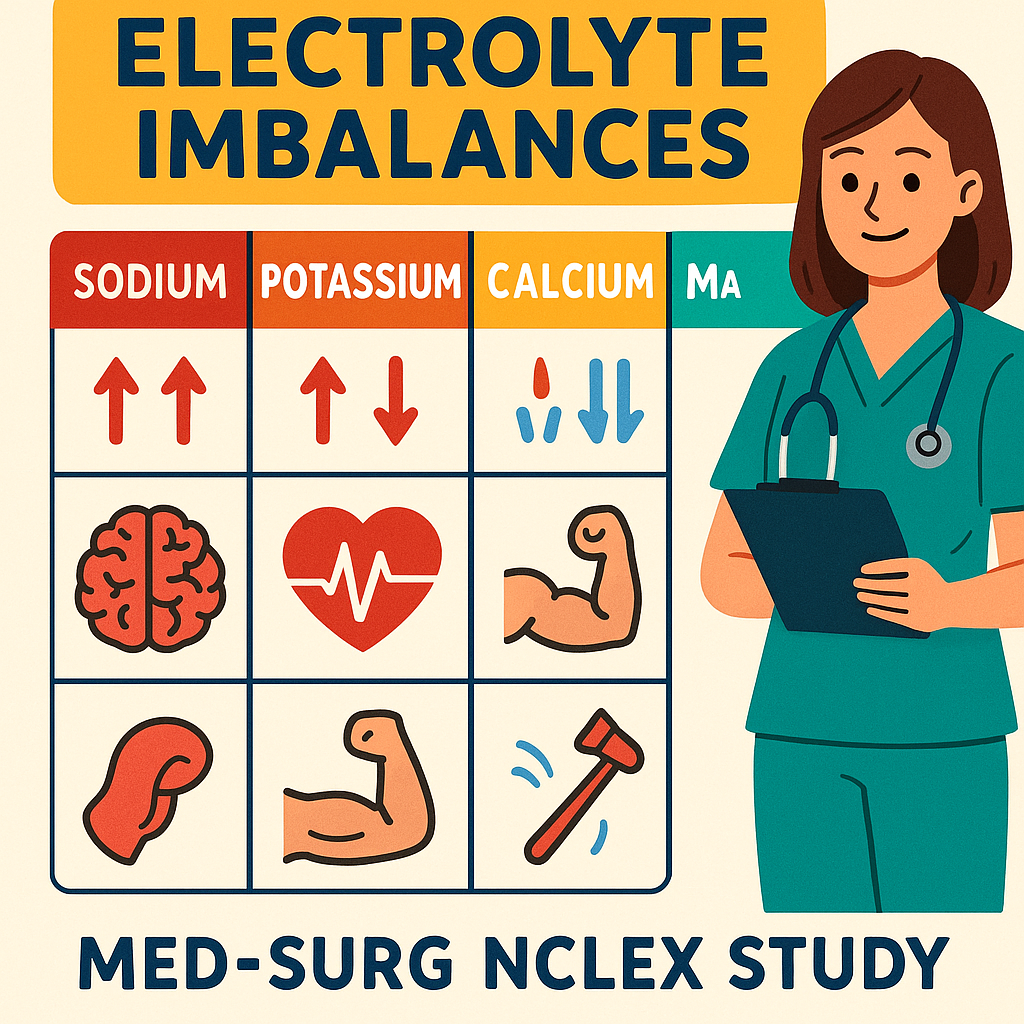Electrolyte imbalances are a must-know for every registered nurse (RN nurse) working in medical-surgical (med-surg) nursing. They show up on countless NCLEX questions, and understanding them is critical for safe patient care. This quick, simplified visual guide will help you spot the big electrolyte problems fast and know what to do — a perfect addition to your nursing bundle for study and practice.
🧂 Sodium (Na+): The Neuro Electrolyte
Normal range: 135–145 mEq/L
- Hyponatremia (low sodium):
- Confusion
- Seizures
- Weakness
- Nausea
- Nursing priority: monitor neuro status, give isotonic fluids if hypovolemic
- Hypernatremia (high sodium):
- Extreme thirst
- Dry mucous membranes
- Restlessness
- Seizures
- Nursing priority: replace fluids slowly, monitor neuro status
💛 Potassium (K+): The Heart Electrolyte
Normal range: 3.5–5.0 mEq/L
- Hypokalemia (low potassium):
- Muscle cramps
- Weakness
- ECG: flat T waves, U waves
- Risk for dysrhythmias
- Nursing priority: replace potassium carefully, watch heart rhythm
- Hyperkalemia (high potassium):
- Weakness
- Paresthesias
- ECG: peaked T waves, widened QRS
- Risk for fatal arrhythmias
- Nursing priority: give insulin + glucose, calcium gluconate, monitor ECG
🩶 Calcium (Ca++): The Muscle/Neuro Electrolyte
Normal range: 8.5–10.5 mg/dL
- Hypocalcemia (low calcium):
- Tetany (muscle spasms)
- Chvostek’s/Trousseau’s signs
- Seizures
- Nursing priority: give calcium supplements, monitor airway in severe cases
- Hypercalcemia (high calcium):
- Weakness
- Lethargy
- Constipation
- Risk for kidney stones
- Nursing priority: encourage fluids, consider diuretics
💙 Magnesium (Mg++): The Reflex Electrolyte
Normal range: 1.5–2.5 mEq/L
- Hypomagnesemia (low magnesium):
- Hyperactive reflexes
- Tremors
- Seizures
- Nursing priority: replace magnesium slowly, monitor for dysrhythmias
- Hypermagnesemia (high magnesium):
- Hyporeflexia
- Bradycardia
- Respiratory depression
- Nursing priority: give calcium gluconate if severe, monitor respirations
📊 Med-Surg Memory Tricks
✅ Sodium = Neuro
✅ Potassium = Cardiac
✅ Calcium = Muscle/Neuro
✅ Magnesium = Reflexes
Add these cheat codes to your nursing bundle to ace NCLEX med-surg questions and keep patients safe on the floor.
🩺 NCLEX Med-Surg Priorities
As an RN nurse, here’s what you absolutely must remember:
- Always get repeat labs if the numbers don’t match the patient’s symptoms
- Replace electrolytes carefully (some need a slow drip!)
- Continuous ECG monitoring for potassium or magnesium issues
- Patient safety first — confusion, muscle weakness, or dysrhythmias can put them at fall risk
- Teach patients food sources of electrolytes for long-term health
🧩 Nursing Bundle Cheat Sheet
Pack these items into your nursing bundle for a quick review:
✅ Visual electrolyte chart
✅ ECG changes for potassium and calcium
✅ Hypo/hyper symptoms side-by-side
✅ NCLEX priority intervention cards
These tools will help you think fast on the floor or during NCLEX review.
📝 Quick Nursing Takeaways
💡 Watch for confusion in sodium issues
💡 Always put patients on a heart monitor for potassium shifts
💡 Know your Chvostek’s and Trousseau’s for hypocalcemia
💡 Never give magnesium too quickly — think safety

